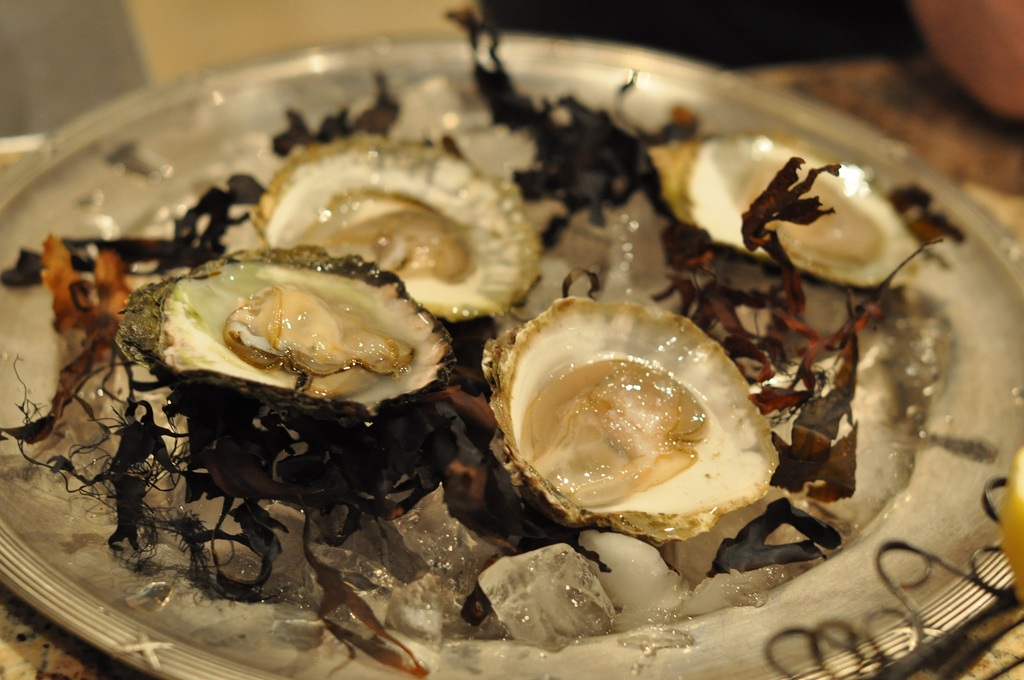Love, Humanity, and… Food?
Two weeks ago, I stabbed myself in the hand with an oyster knife.
I work at a bar that serves oysters, and lately I’ve become enamoured of popping them open. It’s not really my job, but I weasel my way into doing it whenever possible. There’s something very satisfying about finding the hinge, pressing the knife into it, severing the adductor, and loosening the whole thing from the shell. If you do it right the procedure happens in one fluid motion and the recently dead sea-snot pulses and looks very appealing; beautiful even.
We’d just gotten a shipment of Pristine Bays, an east coast varietal with lumpy dreadnought shells and a mossy tinge. I had never had one, and I was so excited to see them that I thought I’d have a little sample right away and greedily fished one out of the box.
Usually when I open oysters I wear a chain-mail glove, which looks butch and prevents me from burying the knife in the soft meat of my palm if something goes wrong. But I’ve been getting better at opening them, and in a wave of pure hubris I forewent the glove and tried to open the little fucker right there.
You have to push hard to get the short, blunt knives through the shell’s hinge. In my attempt, my hand slipped and a piece of shell flaked away and the knife skipped across the top of the oyster and burrowed into my palm about a centimetre below my index finger’s knuckle. I pulled it out and for an uncanny millisecond there was no blood, just a corn kernel–sized divot in my hand. Then there was a lot of blood.
A kid-on-Christmas adrenaline had kicked in full-force and, caution thrown to the wind, I had acted without thinking.
What did this to me? A rock with a booger inside of it.
Food has power. Whether it’s an oyster or a bucket of chicken, your mom’s banana loaf, or a still-in-the-garden zucchini on the cusp of ripeness, everyone feels an uncontrollable attachment and excitement, inextricable from romance and nostalgia and identity, to something. Look around and deny that we are obsessed. We have a TV network devoted to food, produce dozens of documentaries about chefs and restaurants, and take pictures of our meals—even calling them “food porn.”

Photo by @theatrebycommittee, via Instagram
On top of my work as a barman, I’m also a theatre artist. And we theatre artists tend to talk a lot about universality in our world (it’s the fallback of every Shakespeare-apologist I’ve ever met), though it’s usually confined to lofty ideas like love, the human condition, and various emotional states. But food is also universal: we all eat.
With a desire to abandon the abstract and make a play about something universal, my friends and I began The Food Project. We were inspired by methods of creation that result in more documentary-style presentation (and were also afraid to go down the physical/expressive devising paths—not our forte), so we decided to make a piece of documentary theatre about food… generically… as a whole.
Understandably, this fell apart almost immediately. It was too vast, too all encompassing. How the hell do you pick what to talk about when you talk about food?
We decided instead to focus on one unifying idea: can you eat your way to a better world?
We arrived at the question by wondering what motivates all the good-intentioned food journalism out there, and why all this information matters. We stopped calling it a documentary play and started calling it investigative theatre (a term we thought we had invented until a Google search proved that the Civilians and the Belarus Free Theatre have been doing this for years). We did research to figure out where our food comes from, what the ethical and moral cost of it might be, and how we can eat more responsibly.

Photo by @theatrebycommittee, via Instagram
The initial phase of research was depressing. It was a flood of horrifying and alienating information. To make my point, here are three facts about avocados:
- A single avocado accounts for 50-160 litres of wastewater
- Cartels have moved in on avocado production in Michoacán, Mexico, calling the produce “green gold,” a term formerly reserved for marijuana
- Farm communities in Chile have temporarily depleted their aquifers from farming avocados and have had to import water for human consumption.
This kind of information is everywhere—the beyond-inhumane conditions of mass livestock production; the monopoly on corn and soybean monocultures that might be the largest contributor to the obesity epidemic; the depletion of the world’s fish stocks, which is throwing ocean ecosystems into chaos. On and on it goes until you think you will never eat again. But, of course, that isn’t an option.
There is no shortage of problems with the way our food is produced, and merely identifying them was not what we set out to do. So we started to look for solutions to those problems and found our answers in a place seldom embraced by the arts: capitalism.
I know. Hear me out.
Case studies show that buyers can actually shift markets to firmer moral and ethical ground by being informed. Coffee is perhaps the best example of this. Twenty years ago there was very little talk of free trade anything, much less the second most highly consumed commodity in the world (oil is number one). Through initiatives to raise awareness, the Free Trade Certification Board and similar organizations taught coffee consumers about how cheap coffee was hurting farmers and bulldozing rainforests. Now it’s hard to find a grocery store that doesn’t stock multiple ethical and environmentally friendly coffee options. Those products account for about half the market share in coffee—and regular old “powerless” consumers like you and me did that. This kind of thing is still happening. The fair trade market grows every year.
This is not to say that concerted action, petition signing, conscientious voting, and pressure on elected officials can’t or doesn’t make a difference. Due to widespread knowledge of inhumane conditions in pork production, the government voted to phase out gestation crates by 2018, which certainly was not of their own initiative.
It is clearly possible to use legal channels to correct cruelty and ethical misconduct in food production. But those solutions take time, effort, and a willingness to fling ourselves at a bureaucratic wall. We’ve got stuff to do. We’ve got bills to pay—and theatre to make—and it’s easy to justify not making the time to get involved with organizations that do this work. When we saw the coffee story, we realized the important part was that people were informed and made small changes in consumption. We can all do that.

Photo by @theatrebycommittee, via Instagram
Everyone carries the internet in their pocket. We are only a few finger-mashes away from information about anything we might want to eat. And all that has to be done to encourage ethical, responsible food practice is convince others to do the research and make informed choices about where their food comes from and how it got to them. That’s really all it takes to stop avocado cartels. Or net fishing. Or poultry abuse. It’s up to the individual consumer to decide where they draw the ethical line the sand.
My line, for instance, allows me to eat meat. I don’t have an issue with consuming it, just with the unnecessary torture that is part and parcel of rearing cheap meat. So I don’t buy that meat anymore and am helping to create a market for what I believe is a better alternative. I think there’s power in that. I hope there is.
There is the potential for this kind of analysis to get overwhelming, to elicit panic. I am continually worried that I am not doing enough, that I’m not doing my research. I look down at a Wunderbar I bought on impulse and realize I know nothing about where that chocolate comes from, where the wrapper ends up, or what Polysorbate 60 might be. (Answers: South America, a landfill probably, and an emulsifier derived from corn). I’m still on the fence about whether or not the chocolate bar is ethically responsible.
And I think that it’s okay to eat with occasional uncertainty. Definitive answers to ethical questions are hard to come by.
There is no way for our tiny play to fix the vast and systemic problems with the way food is produced in the modern world. But there is the potential for it make people curious about what they’re eating, for those people to change the way they shop, and maybe for them to convince some friends to do the same. There must be other people out there willing to stab themselves over a bivalve, and those are the kinds of lunatics who might end up making a difference.









Comments